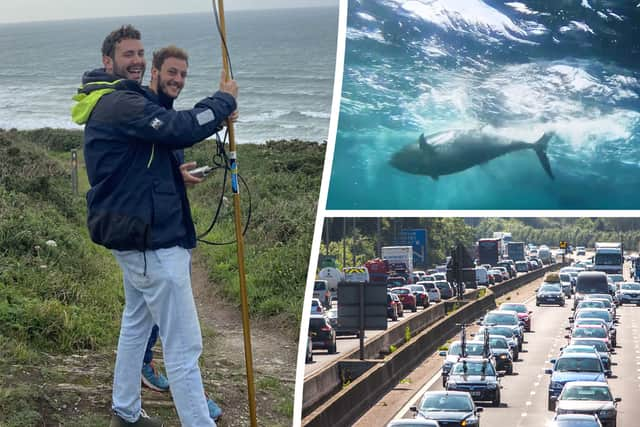Scientists launched a rescue mission to Birmingham for tuna satellite-tag used for research
and live on Freeview channel 276
Scientists who satellite-tagged a tuna followed it up the M5 to Birmingham - after it was picked up by a tourist by mistake.
Researchers at the University of Exeter had tagged the Atlantic bluefin tuna off Plymouth in Devon a few weeks ago as part of a research project.
Advertisement
Hide AdAdvertisement
Hide AdBut the tag safely detached itself from the giant fish - and later signalled researchers that it had washed up on Whitsand Bay in Cornwall. But when the PhD students sent to collect it proved unable to find the tag for over two days, they checked its GPS location beacon.
They found it was on its way to Birmingham up the M5 and the uni team quickly launched an appeal to recover it. After making three radio appeals the device was eventually recovered thanks to the help of two BBC local radio stations.
Brian Shuttleworth had been on holiday in Cornwall and had spotted the tag among some seaweed while walking on the beach - and taken it home to Lancashire. Dr Lucy Hawkes, one of the leaders of the tuna-tagging project, said: “These tags collect very detailed information, but they only transmit their location – to get the rest of the data, we have to recover the tags.
“They are designed to fall off the tuna after about six days, and obviously we can’t control where the tuna go, so the tags can be hard to recover. We have deployed 20 to 30 tags over five years and recovered eight so far. The tags are incredibly useful for our work, so I wasn’t ready to give up on this one. We assumed someone had picked the tag off the beach and driven home from their holiday.’’
Advertisement
Hide AdAdvertisement
Hide Ad

After initially making her appeal for the tag to be returned via a call in to BBC Radio West Midlands, the tag started moving again - this time heading to the village of Ribby, Lancashire. Refusing to give up, Dr Lucy then secured two interviews on BBC Radio Lancashire where she again asked for the tag to be returned - prompting the station to offer to send a reporter to the village the next day.
Lucy added: “On Sunday night, the tag moved again. We received high-quality tracking information that made me quite sure it was in a tiny village called Ribby, just south of Wesham. BBC Radio Lancashire called to see if we’d found the tag yet, and had me on again that evening.”
At that point, Lancashire resident Brian Shuttleworth called in after his wife heard the end of the BBC Radio Lancashire evening segment on the missing tag.
Brian had been on holiday in Cornwall and had spotted the tag among some seaweed while walking on the beach. After attempting to call the phone number listed on the device, which failed due to his poor mobile phone signal, he decided to take it home with him to Lancashire.
Advertisement
Hide AdAdvertisement
Hide Ad

Brian said: "We were holidaying in Cornwall, and we’d gone down onto the beach and were just having a walk along the beach. The tide had started to come in, and I saw it in amongst a load of seaweed. I recognised what it looked like, detangled it and put it in my pocket with every intention to ring the phone number in tiny writing on it.
"Unfortunately, the mobile signal down there is not very good. So I thought ‘when I get home I’ll ring it up and organise for sending it back’."
After completing their long drive home, Brian was distracted from calling the number after he discovered that his house had been infested with mice. As a result, the researchers had even tracked Brian on his way to his mother’s house for the night, and his shopping trip the next morning.
He added: "When we eventually got home from my mum’s on Monday, we caught the tail end of the story about the tracker on the BBC and it just escalated from there."
Advertisement
Hide AdAdvertisement
Hide AdThe device has since been returned to Plymouth via mail - with researchers tracking it’s journey home the whole way. Dr Hawkes said: “This just goes to show the dual power of animal tracking for conservation mixed with local radio!"
Comment Guidelines
National World encourages reader discussion on our stories. User feedback, insights and back-and-forth exchanges add a rich layer of context to reporting. Please review our Community Guidelines before commenting.